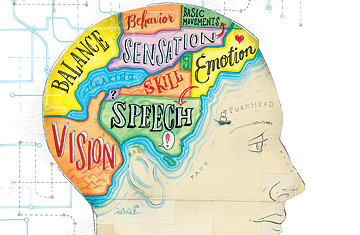A little bone for the yogis in the age old yoga versus exercise debate? A small new study shows 20 minutes of yoga beats out 20 minutes of aerobic exercise for the old thinking noodle. (That’s your brain!)
Researchers at University of Illinois at Urbana-Champaign studied “The Acute Effects of Yoga on Executive Function“, or as the peer-reviewed article was titled, and which generally means yoga’s effect on cognitive processes (working memory, reasoning, problem solving, attention, planning, etc.). The study which will be published in the Journal of Physical Activity & Health, involved 30 non-yoga practicing undergraduate women who participated in 20 minutes of Hatha yoga, accompanied with meditation and deep breathing as well as 20 minutes of “aerobic activity” which meant running on a treadmill.
What’s worse than having to run on a treadmill for 20 minutes? Having to take a test afterwards. Researchers had participants do cognitive testing following both the yoga and the running exercises to measure working memory and inhibitory control (attention span). And guess what? Yoga beat the pants off running when it came to brain function.
Lead researcher Neha Gothe (currently a professor of kinesiology at Wayne State University) told the Daily Mail:
“It appears that following yoga practice, the participants were better able to focus their mental resources, process information quickly, more accurately and also learn, hold and update pieces of information more effectively than after performing an aerobic exercise bout.”
As opposed to when the participants “showed no significant improvements on the working memory and inhibitory control scores” after the 20 minutes of jogging or walking on the treadmill.
And all the scientists lightbulbs light up! Because this is cause for further research and investigation. Edward McCauley, co-author of the study and director of the Exercise Psychology Lab where the research was conducted, notes:
“This study is extremely timely and the results will enable yoga researchers to power and design their interventions in the future. We see similar promising findings among older adults as well.
Yoga research is in its nascent stages and with its increasing popularity across the globe, researchers need to adopt rigorous systematic approaches to examine not only its cognitive but also physical health benefits across the lifespan.”
Sure it’s a small study, and there is much more to be explored about the effects of not just physical yoga poses, but the meditation and breathing components of most Western yoga practices (and for guys, too). But, hey, this is good news! That perhaps some of us already knew? And besides, it’s a great conversation piece the next time your runner pals talk about how ah-MAZ-ing their runner’s high is and how they don’t really need yoga cause, like, running is their meditation. You can simply nod your head and smile, and then share with them just how smart you are. (No offense, runners. We love endorphins, too!)
The study concludes that more research needs to be done on non-traditional, mind-body exercises like yoga (and tai chi, for example) and just how much they seep into the rest of our daily activities when we’re not knee-deep in virasana.
“The breathing and meditative exercises aim at calming the mind and body and keeping distracting thoughts away while you focus on your body, posture or breath,” Gothe told the Telegraph. “Maybe these processes translate beyond yoga practice when you try to perform mental tasks or day-to-day activities.”
A little like…living your yoga.
This could bode well for further research on the effects of yoga and autism and ADD/ADHD, as well as psychiatric disorders or other brain-related conditions.
From: Yoga Dork

